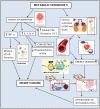Heart failure in patients with metabolic syndrome X
- PMID: 37496710
- PMCID: PMC10368463
- DOI: 10.15190/d.2023.1
Heart failure in patients with metabolic syndrome X
Abstract
Metabolic syndrome X has been known to be a risk factor for the development of cardiovascular dysfunction. Insulin resistance, diabetes mellitus and serum lipid abnormalities, which are all seen in metabolic syndrome X, have been found to negatively impact heart function, leading to heart failure in particular. Heart failure is a condition resulting when the heart is unable to perform its function of providing sufficient blood flow to meet the body's requirements. The treatment of heart failure in metabolic syndrome X varies based on the various components of metabolic syndrome X, which include obesity, hyperglycemia, hypertension and dyslipidemia. Obesity is regarded as one of the derangements seen in patients with metabolic syndrome X. It is a significant risk factor in the development of cardiovascular disease, which may eventually lead to heart failure. However, the obesity paradox suggests that obesity provides a higher chance of survival in patients with metabolic syndrome and heart failure. This review article focuses on the pathophysiology of heart failure in patients who already have metabolic syndrome X, as well as the therapeutic management complexity of the two conditions taking into consideration the protective role provided by obesity.
Keywords: Metabolic syndrome; heart failure; insulin resistance; obesity paradox; obesity..
Copyright © 2023, Olatunbosun et al., Applied Systems and Discoveries Journals.
Conflict of interest statement
Conflict of interests: The authors declare no conflicts of interest.
Figures
References
-
- Metabolic syndrome X: a review. Timar O, Sestier F, Levy E. The Canadian journal of cardiology. 2000;16(6):779–89. - PubMed
-
- Prevalence of metabolic syndrome among adults 20 years of age and over, by sex, age, race and ethnicity, and body mass index: United States, 2003-2006. Ervin R Bethene. National health statistics reports. 2009;(13):1–7. - PubMed
-
- The metabolic syndrome predicts incident congestive heart failure: a 20-year follow-up study of elderly Finns. Wang Jianjun, Sarnola Katriina, Ruotsalainen Sanna, Moilanen Leena, Lepistö Päivi, Laakso Markku, Kuusisto Johanna. Atherosclerosis. 2010;210(1):237–42. - PubMed
-
- Epidemiology of Heart Failure: A Contemporary Perspective. Roger Véronique L. Circulation research. 2021;128(10):1421–1434. - PubMed
Publication types
LinkOut - more resources
Full Text Sources


